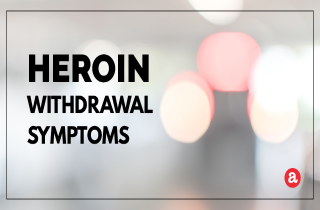Thinking about detoxing from heroin?
Heroin addictive properties can make heroin withdrawal a painful and uncomfortable process, although it is technically safer than alcohol withdrawal. Still, sudden withdrawal by heavily dependent users who are in poor health can be fatal. Symptoms occur because when levels of heroin in your system start to drop, heroin no longer acts on opioid receptors in the central nervous system, and the body attempts to normalize brain function. More here on what heroin withdrawal symptoms to expect during detox. Plus, a section at the end for your questions about heroin.
Why do heroin withdrawal symptoms occur?
Heroin represses pain receptors and induces states of euphoria. More importantly, if you take heroin over time, you will become physically dependent on it. With physical dependence, the body adapts to the presence of heroin and withdrawal symptoms occur if use is reduced abruptly. And the more heroin you use, the more your body becomes dependent on the drug and the worse the withdrawal symptoms become.
When you start to detox from heroin your body thinks that it needs the drug in order to function properly. This is why the physical need for heroin makes it difficult to stop using heroin and many times relapse is a likely occurrence.
What are symptoms of heroin withdrawal?
Heroin cravings alone makes it difficult to cope with withdrawal symptoms – coming off the euphoric high and feelings of depression and agitation make it difficult to combat symptoms. You can expect to feel heroin withdrawal between 6-24 hours after your last heroin use. The degree and time you go through withdrawal symptoms fluctuates depending on the dose of heroin you’re used to. There are a variety of symptoms you may experience withdrawing from heroin. Symptoms include:
- akathsisa (inner restlessness)
- cold sweats, chills
- constipation
- excessive yawning
- fever
- malaise
- nausea
- pain and cramps the body
- priapism (persistent and painful erection of the penis)
- sweating
- tearing (involuntary tears in the eyes)
- vomiting
Latent symptoms of heroin withdrawal include:
- abdominal cramps
- diarrhea
- diluted pupils
- disturbed sleep
- depression
- drug cravings
Heroin withdrawal symptoms: How long?
Symptoms of heroin withdrawal can manifest a few hours after you missed an expected dose and peak around 42 to 72 hours after the last administered dose. Major heroin withdrawal symptoms won’t subside til about a week after the last heroin dose. However, some symptoms of withdrawal, called “protracted withdrawal symptoms” or PAWS, can last for weeks to months after your last dose. And the psychological effects of heroin addiction may last your entire life. You may find yourself always battling heroin cravings as the presence of stressors emerge in your life.
Heroin withdrawal symptoms treatment
It is important to be monitored while you are withdrawing from heroin. And that you have supportive care in place to prevent relapse. There are several possible treatments that you can seek. Some doctors prescribe Clonidine which reduces anxiety, agitation, muscle cramps, sweating. Buprenorphine has also been said to shorten detox.
Some have used a method called, “detox under anesthesia” or “rapid opiate detox”. Here you are put under anesthesia and injected with opiate-blocking drugs to speed up the bodies return to normal opiate function. However, this method comes with unnecessary risks and has not been proven to shorten heroin withdrawal or reduce the intensity of withdrawal symptoms. In fact, there have been a few deaths reported with this procedure (heroin withdrawal causes vomiting).
Longer term treatment is also recommended. Perhaps opiate substitution therapy can help you live a productive life (Ex. methadone maintenance). Psychological counseling and cognitive behavioral therapy can also help address the root causes for drug seeking. Support groups such as Narcotics Anonymous or SMART recovery can also help with the physical and psychosocial addiction to heroin. Addiction is a life time condition and having these supports are always helpful to keeping from abusing heroin again.
Heroin withdrawal symptoms questions
If you have anymore more questions about Heroin ask them below. We are happy to respond to you personally, and will try to answer your questions ASAP. And if we don’t know the answer, we will refer you to someone who does.









Related Posts